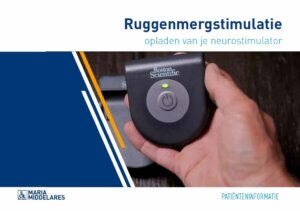Charging your neurostimulator
What is it?
What is it?A neurostimulator is a permanently implanted (rechargeable) battery. Your stimulator sends an electrical current to the electrode. The stimulator requires energy to do this and must be charged periodically with the help of a separate charging system.
Practical information
Practical informationThe neurostimulator works with a programme that allows you to feel the tingling. This is generally more energy efficient than the programmes where you do not feel anything. The nurse can see in the programming system what the recommended charge time is for each programme. You can follow these recommendations, but you can also develop a charging schedule that better fits your personal lifestyle.
The charging system consists of:
- a charger
- a base station
- a power unit
This set comes with a handy belt that holds the charger so you can charge while you go about your daily activities.
Guidelines for at home
Guidelines for at homeTo charge the neurostimulator, you plug your base station adapter into an accessible electrical outlet in the wall, one where the components are not exposed to moisture or direct heat. Set the charging station on a flat surface. Then place your charger in the base station with the power button facing upwards. You do not need to do anything else to start.
The base station can stay connected to the mains current. You can keep the charger in the base station in-between the times you charge. It's not harmful at all to keep your charger 24/7 in the electrical outlet. When the stimulator has to be charged, just take the charger out of the base station and place it in the charging belt. Then press the round button. The charger will start to beep. Now look for your stimulator while wearing the charger. Once the charger is at the level of the stimulator, the charger will stop beeping. When the battery is completely charged, it will emit a double beep.
Leaflet
LeafletSee the leaflet below for more information about:
- charging schedule
- battery status
- practical tips and complications
Only available in Dutch:

Opladen van je neurostimulator
DownloadCentres and specialist areas
Centres and specialist areas
Something wrong or unclear on this page? Report it.
Latest publication date: 13/08/2024
Supervising author: Dr. Decaigny Veronique





